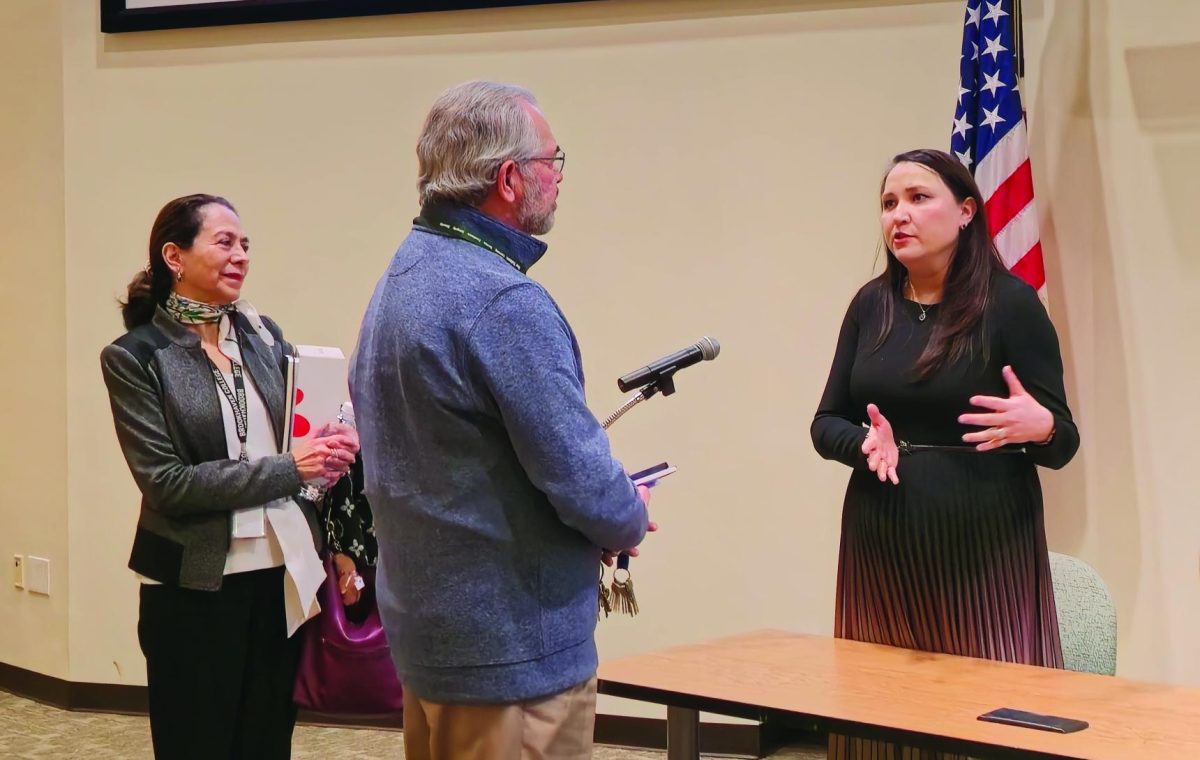The Women in Science and Healthcare Foundation hosted a seminar on Feb. 28 in the Brookhaven campus, where students and staff gathered for food, socialization and a dive into an inspiring journey of the guest speaker, Dr. Sandra Saldana.
The event kicked off with a quick overview of Dallas College’s STEM institute that aims to provide learning experiences for scholars, build connections and become career ready. Iris Duarte-Bazaldua, professor of Biology at Dallas College, served as a moderator for the seminar.
Jovelyn Castellanos, WISH director of initiative and public affairs, was called to do an opening speech where she tackled the basics of health innovation startups. Castellanos said, “The company I work with [WISH] help[s] innovation startup[s] get funding, internships and resources.”
Castellanos said that a startup begins with ideas and the desire to change the current ways of the healthcare system. “We’re international accelerators, so we have companies based here in Texas, the United States, France and Italy,” she said.
WISH aims to increase the amount of entrepreneurship in science, technology, engineering and management, especially female entrepreneurs. Castellanos said, “Think about those ideas, [like] this could be a different way to deliver mental health or the problem in nursing – know that we’re here to support those.”
Castellanos also encouraged attendees to join in the upcoming Hackathon organized by the Texas Healthcare Challenge. This event features collaborations between various professions and occupations joining together to empower developments, focusing on the assessment of innovation and business models from different teams. Castellanos said, “If you want to do something fun, learn a lot of things and be at the forefront of healthcare innovation, this is the place to be.” Winning projects can receive up to $10,000 as a prize, giving the innovators a chance to invest in their project. The TXHCC Hackathon will kickstart on April 4 and last for 2 days. “It’s going to be a great weekend, [with] a lot of fun prizes and funding, it’s also a great way to network,” Castellanos said.
The room was filled with a round of applause as Duarte-Bazaldua introduced the guest speaker, Dr. Sandra Saldana, the CEO and co-founder of Alva health. According to the invitation sent by Brookhaven biology professor Neda Tousi, “Alva Health is a MedTech startup that is developing a remote monitor that detects neurological injury and stroke for people living with chronic risk of cardiovascular disease.”
Saldana said, “In Boston, I spent about four to five years in the industry, applying some of the knowledge I gained in my PhD, and started to translate that into the business world.” Saldana took an interest in entrepreneurship and she realized that scientific innovations were bought to life in the business field.
Saldana began to study business and started to build networks with scientists, clinicians and fundraisers. In the question-and-answer segment, Duarte-Bazaldua asked about how Saldana’s interdisciplinary education helped her in leading and solving problems in her company to which Saldana replied, “It is really important to understand both the technical aspect of the product… and how does that actually translate into dollars and making products fly commercially.” She said that her PhD helped her in building the product using scientific methods to materialize her ideas which was a foundational in her career as a healthcare entrepreneur.
Saldana said, “We’re creating a non-invasive wearable device for real time stroke detection for patients with high risk of stroke.” More than half of stroke survivors sustain chronic disabilities that would require specialized care. The device is focused on detecting early signs of ischemic stroke, giving physicians time to respond and prevent fatalities. “We’re looking for hemiparesis – an asymmetry in the upper body which is a very common symptom of stroke, but it’s very subtle at the beginning so people tend to disregard it until they realize it’s not going away and it’s getting worse.” She said that 90% of the patients do not go to the hospital until six hours later, missing the golden time for treatment. For stroke patients, every minute counts, as the delay of treatment can increase the chances of death or otherwise irreversible damages.
Saldana said, “There’s a mobile app and cloud base monitoring where we detect signals in real time. There are proprietary algorithms that are used to track symptoms in real time.” This algorithm would send a message to the patient about their symptom and connect them with emergency services. “We automate everything to make sure that stroke patients would get to the hospital as soon as possible,” Saldana said.
When asked what her advice was to students who are struggling to pick between research path and entrepreneurship, Saldana said, “You don’t have to choose between one or the other. I always followed my passion – I wanted to make impact in people’s lives so I did whatever I had to do.”
Maradith Baker, student at Dallas College, said, “The seminar was fun and very informative.”
The seminar ended with the expression of gratitude to the speakers, and the attendees got the chance to converse with Saldana and voice questions, concerns or ask for advice.








